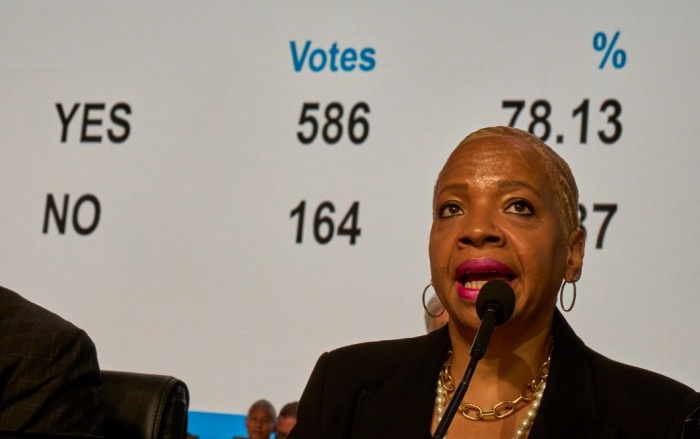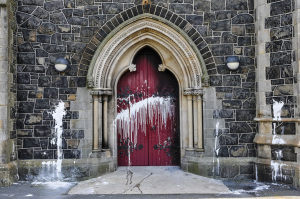UMC moves closer to allowing regions pick own stance on LGBT marriage, ordination

The United Methodist Church General Conference has advanced a measure meant to allow different regions of the global denomination to determine their own standards on LGBT issues.
At the Thursday plenary session of the General Conference, delegates voted 586-164 in favor of a petition for an amendment to the UMC’s constitution allowing for regionalization. The petition will now be sent to the annual conferences for possible ratification.
The amendment will need to gain at least two-thirds support from the annual conference clergy and lay voters to be added to the UMC constitution, reports UM News.
At present, the UMC Book of Discipline, the denomination's rulebook, prohibits the blessing of same-sex unions and the ordination of noncelibate homosexuals.
These rules have largely remained in the Book of Discipline because of delegates from Africa and elsewhere abroad who tend to be more theologically conservative than their American peers.
If regionalization is ratified, it could effectively pave the way for American churches to have their own Book of Discipline apart from African churches and thus amend it to allow for same-sex marriage and noncelibate homosexual clergy.
Rob Renfroe, publisher of Good News Magazine, participating at the General Conference, expressed his concern about the proposal in a statement emailed to The Christian Post.
“It is presented as a way to empower the church in each region of the world to do ministry in their particular context by adapting the Book of Discipline to their cultural settings. The real motive is to allow the church in the US to change the definition of marriage and to ordain practicing gay persons,” stated Renfroe.
“In the future, if Africa stays in the UMC, delegates from outside the US will far outnumber delegates from the West very soon. So, to keep Africa from determining the sexual ethics of the entire UMC, this legislation will marginalize the Africans and other traditionalists from around the world so that they have no say in defining marriage, sexual morality, etc., for the entire church.”
Christine Schneider, a reserve delegate from the Switzerland-France-North Africa Conference and member of the Standing Committee on Central Conference Matters, which submitted the proposal, spoke in favor of the measure during the plenary session discussion.
“This is the result of excellent collaboration by people from all walks and parts of our connection,” said Schneider, adding she was “full of hope and also excited” about the measure.
The Rev. Jonathan Ulanday, a delegate from the Philippines who was involved in crafting the Christmas Covenant, a measure calling for regionalization, also voiced support.
“What we are trying to do is to place our Lord Jesus Christ at the center of the table and all of us will exist in equity sharing the gifts so the United Methodist Church will grow and flourish in different contexts in different parts of the world,” Ulanday said, as reported by UM News.
The General Conference in Charlotte, North Carolina, began on Tuesday and will conclude May 3.
Over the past few decades, there has been a fierce debate within the UMC over whether to change its Book of Discipline rules on LGBT issues like marriage and ordination, mainly in response to changing social norms in the United States.
Although efforts by delegates at General Conference to change these parts of the Book of Discipline have consistently failed, many theological liberals have refused to follow or enforce them.
In 2019, at a special session of General Conference, delegates voted to amend the Book of Discipline by adding Paragraph 2553, a temporary measure that provides a disaffiliation procedure for congregations seeking to leave the UMC over the debate.
According to UM News, from 2019 to 2023, more than 7,500 congregations left the denomination via Paragraph 2553, with most joining The Global Methodist Church, a conservative theological alternative to the UMC.
Also, on Thursday, delegates voted to approve Petition 21103, which gives the Eurasian Episcopal Area, which has four annual conferences, autonomy, and the ability to disaffiliate from the denomination.





























